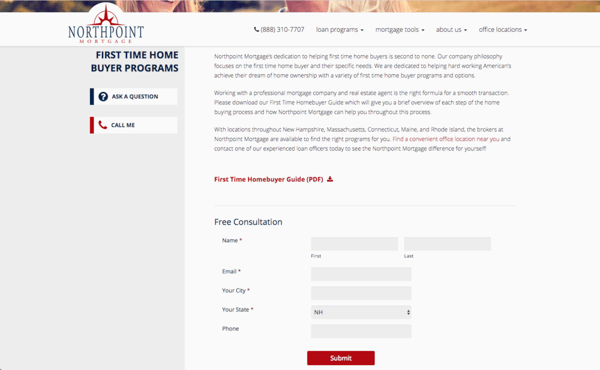Figuring out how to acquire your own quality, online mortgage leads isn’t always easy. But, luckily, the Lead Magnet is a tool you can implement to attract potential customers.
What is a Lead Magnet? In its application to online mortgage lead generation, a Lead Magnet is a special piece of content that provides enough value that it entices potential customers to provide their lead information in exchange. A great example of a Lead Magnet is the “First-Time Homebuyers Guide” published by Quicken Loans.
 Northpoint Mortgage set up a specific landing page for their first-time homebuyer guide
Northpoint Mortgage set up a specific landing page for their first-time homebuyer guide
Lead Magnets are great lead generation tools because they encourage consumers to visit your website or landing page and willingly give you their lead information--which is the primary goal of content driven inbound marketing.
Lead Magnets are also great tools because they allow your visitors to “self serve” content that is relevant to them. This means they can get answers to questions that they may need from a Loan Officer, without actually having to call someone.
This is a smart way for you to start developing a relationship with your new lead. However, it's probably not the best idea to call or email the lead at this juncture. Most likely, this lead needs to be nurtured with more content before they’ll be ready to answer a personal phone call or email from an MLO.
Convinced that Lead Magnets are a good thing for online lead generation purposes? Great! Here are three Lead Magnets ideas you can create and share on your website or landing page to generate more traffic and, ultimately, more leads.
Lead Magnet Idea #1: Content to Help First-Time Homebuyers
For those of us who have been through the mortgage application, processing, underwriting, funding, and closing procedures, we know how tricky it can be to secure financing for your home.
Now just imagine how much more confusing it is for a first-time homebuyer. Many homebuyers are trying to understand how much they can afford to put towards a down payment, what the timeline and processes are to fund and close a loan, and what all the crazy mortgage terms (LTV, DTI, etc.) mean. Offering a simple guide, is a great first step in establishing a meaningful connection with a first-time homebuyer.
I’d also like to note that many first-time homebuyers fall into the Millennial demographic. There have been tons of thought leadership and analysis on marketing to Millennials, but there is a key takeaway that stands out amongst all the data: Millennials prefer to learn about a product or service on their own time and only want to talk to a salesperson when it's absolutely necessary.
This makes a lot of sense, because most Millennials have grown up in an environment where the Internet has always been available to provide immediate information. By offering content packaged up in a Lead Magnet, you have a much better shot at capturing more Millennial leads.
Lead Magnet Idea #2: Content to Help Reverse Mortgage Targets
Reverse mortgages are quickly becoming a popular product due to the enormous amount of equity that senior homeowners have accumulated. In fact, there are roughly 165,000 searches a month on the term “reverse mortgage” alone. Clearly, there are people out there looking for information about this product!
If you offer this product, it makes sense to distill technical reverse mortgage information into a user-friendly Lead Magnet. This is because you’re targeting a very specific demographic (homeowners over the age of 62) and the product is a relatively new one to this group. In your PDF guide (or however you decide to structure your Lead Magnet) you can talk about the benefits and risks of a reverse mortgage. You can also provide case studies or testimonials.
By providing this type of information, and including both the pros and cons, you’re building an enormous amount of trust with people who are new to your brand. If they provide their lead information in exchange for your download, they are probably interested in a reverse mortgage--and, therefore, a quality lead.
Lead Magnet #3: Content to Help Newcomers to a Community
This is a lead generation strategy that works well for Realtors, and it can work equally well for mortgage companies. The concept behind this strategy is to provide useful information about a community or neighborhood that your potential borrowers are interested in. You could include information about the local school district, popular businesses, and family attractions that are at the heart of this community.
Just be sure to create “hyper-local” community guides. This means that you should focus on very specific neighborhoods and communities, as opposed to large cities or towns. For example, don’t build a community guide around Los Angeles. Focus on smaller communities like Palms, Beverlywood, and Cheviot Hills, which are all small communities on the west side of LA. Why? There are probably tons of community guides on the larger cities and towns. You can increase the likelihood that your content will be seen by making it very specific to a small community. You don’t want to compete against the content that’s already out there, so focus on the areas that are of interest to your target audience to generate leads.
The information in this guide isn’t heavily mortgage related, but that's okay! The idea here is to provide useful information for someone who is just starting to research homes in a new community.
Bonus tip:
Encourage leads to take the next step by inviting them to get a pre-approval letter before signing up with a Realtor or starting the house-hunting process. This is a great Call to Action to get an additional conversion from your Lead Magnet because the reader will need to contact your mortgage company to get the pre-approval letter.
Conclusion:
Let’s wrap up with one final (but important) point: The content that your lead consumes actually gives you a lot of insight into that lead. For example, if someone downloads a “First-Time Homebuyers Guide,” there’s probably a good chance that they’re buying their very first home. Alternatively, if someone downloads a “How to Use a Cash-Out Refi to Finance Your Home Improvements & Pay Down Debt Guide,” chances are they’re already a mortgage customer and probably a prime target for a cash-out refi.
This is all valuable information for the MLO when it is appropriate for them to follow up. And doesn’t everyone like having a little bit of intelligence on a marketing lead that was passed to them?
Are you currently using Lead Magnets in your lead generation strategy? Has the strategy been successful for you? Whether you’ve had positive or negative results, we’d love to hear from you!
.png)


